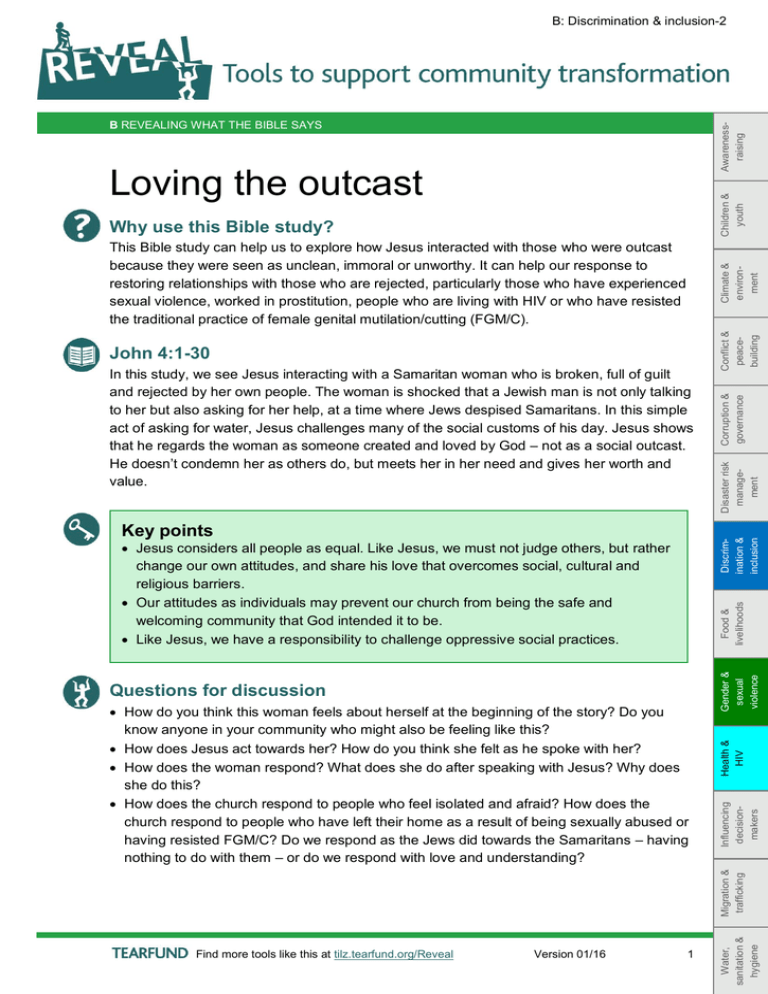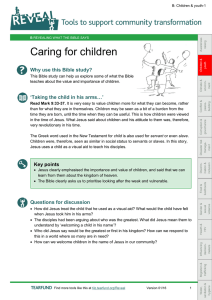
B: Discrimination & inclusion-2
Awarenessraising
B REVEALING WHAT THE BIBLE SAYS
Children &
youth
Loving the outcast
Why use this Bible study?
Discrimination &
inclusion
Key points
Corruption &
governance
In this study, we see Jesus interacting with a Samaritan woman who is broken, full of guilt
and rejected by her own people. The woman is shocked that a Jewish man is not only talking
to her but also asking for her help, at a time where Jews despised Samaritans. In this simple
act of asking for water, Jesus challenges many of the social customs of his day. Jesus shows
that he regards the woman as someone created and loved by God – not as a social outcast.
He doesn’t condemn her as others do, but meets her in her need and gives her worth and
value.
Disaster risk
management
John 4:1-30
Conflict &
peacebuilding
Climate &
environment
This Bible study can help us to explore how Jesus interacted with those who were outcast
because they were seen as unclean, immoral or unworthy. It can help our response to
restoring relationships with those who are rejected, particularly those who have experienced
sexual violence, worked in prostitution, people who are living with HIV or who have resisted
the traditional practice of female genital mutilation/cutting (FGM/C).
Find more tools like this at tilz.tearfund.org/Reveal
Version 01/16
1
Health &
HIV
Water,
sanitation &
hygiene
Migration &
trafficking
How do you think this woman feels about herself at the beginning of the story? Do you
know anyone in your community who might also be feeling like this?
How does Jesus act towards her? How do you think she felt as he spoke with her?
How does the woman respond? What does she do after speaking with Jesus? Why does
she do this?
How does the church respond to people who feel isolated and afraid? How does the
church respond to people who have left their home as a result of being sexually abused or
having resisted FGM/C? Do we respond as the Jews did towards the Samaritans – having
nothing to do with them – or do we respond with love and understanding?
Influencing
decisionmakers
Questions for discussion
Gender &
sexual
violence
Food &
livelihoods
Jesus considers all people as equal. Like Jesus, we must not judge others, but rather
change our own attitudes, and share his love that overcomes social, cultural and
religious barriers.
Our attitudes as individuals may prevent our church from being the safe and
welcoming community that God intended it to be.
Like Jesus, we have a responsibility to challenge oppressive social practices.
B: Discrimination & inclusion-1
B LOVING THE OUTCAST
Reflection
Awarenessraising
Give thanks that Jesus came into the world to save it, not to condemn it. Many women and
girls who have experienced sexual violence or have not undergone FGM/C face a sense of
exclusion within their communities. Pray for our attitudes to be changed and for the church to
be a safe place for these women and girls.
Children &
youth
Climate &
environment
Related tools
A1 – Revealing violence against women and girls: information for facilitators [A1: Gender &
sexual violence-1]
A2 – Understanding vulnerability and disability [A2: Discrimination & inclusion-1]
B – Caring for widows and orphans (Bible study) [B: Discrimination & inclusion-3]
B – Attitudes towards disease and difference (Bible study) [B: Discrimination & inclusion-1]
B – HIV and AIDS and the glory of God (Bible study) [B: Health & HIV-1]
Conflict &
peacebuilding
Corruption &
governance
Disaster risk
management
Discrimination &
inclusion
Food &
livelihoods
Gender &
sexual
violence
Health &
HIV
Influencing
decisionmakers
Migration &
trafficking
Water,
sanitation &
hygiene
Find more tools like this at tilz.tearfund.org/Reveal
2










